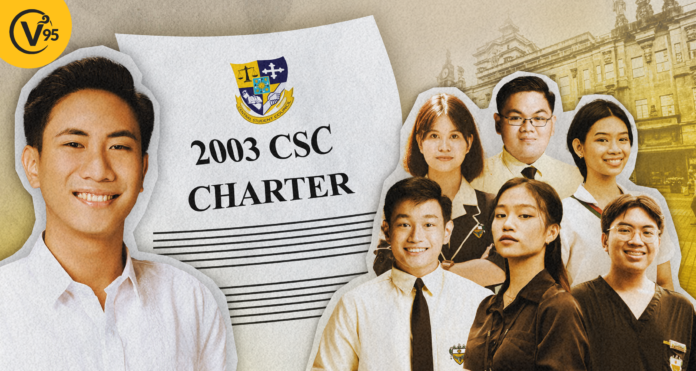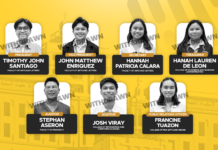
THE OUTGOING UST Central Student Council (CSC) believes the time has come to push through with the constitutional revision necessary to overcome the “limitations” of the current system as Thomasians are set to elect new student leaders for Academic Year 2023 to 2024.
“[It is] something that will be beneficial, especially for the future of CSC — in a sense na magkakaroon tayo ng mas empowered systems to actually enact the policy changes needed, without having to be limited with the current one we have right now,” incumbent president Nathan Agustin told the Varsitarian.
Council leaders have sought to update the 2003 charter, only to see their efforts doomed because of a lack of support or time constraints.
In this new attempt, outgoing CSC leaders are using the remainder of their term to muster support from Thomasians and clinging to their successors to make the revisions a “reality.”
“[W]e really want to maximize information campaigns, especially when it’s already cleared na rin through the e-ReSERVe (Electronic Reservation of Scheduled Events and Reservation of Venue) processes that we have right now. We have one pending, but we’re waiting for its release,” Agustin said.
“[W]hat we can do to ensure that this will continue. Number one: Dapat seryosohin ang transitory process. Hindi ‘yung tipong ititiwala na lang natin sa next officers ito. The plan here is to lay down the groundwork during the end of this term. And by laying down the groundwork, this does not mean that we just leave something and let them pick it up. We pass it upon them; we pass it to them.”
Thomasians got a glance at the proposed amendments on March 5 when Agustin publicized a Google Docs working file.
Among the major overhauls eyed is the establishment of the Central Student Legislative Assembly (CSLA) in lieu of the existing Central Board, composed of senators voted locally.
“[T]his congress will be charged fully with legislative powers – no more ex officio duties, no more obligations in the student council, which will allow them to fully engage with the policy-making,” Agustin explained.
“LSC (Local student council) presidents are expected to supervise their home [organizations], which also has its own legislative assemblies and has their own processes they have to go through.”
Agustin emphasized that an LSC president and an LSC senator may serve as checks and balances on each other.
“[I]t’s a demarcation of concerns that we also hope would be the emphasis na magkaroon na ng bagong system in governance. It would, hopefully, na pag-uusapan na rin ng LSC presidents and senators as to how they will view the responsibilities vis-a-vis their constituents,” he said.
Election overhaul
Another major overhaul eyed in the charter touches on which positions Thomasians can vote for. Only the president and vice president of the CSC executive board will be elected, while the CSLA will elect all the other positions down the line.
“[T]he President will yield nominees, ang nakalagay sa framework right now [ay] dapat meron siyang nominees per position, and these nominees may be taken from any process such as pwede sila ‘yung nakitaan ng president ng abilities to lead,” Agustin said.
The names of the nominees would then be publicized through student publications so that the student body could be made aware of the hand-picked candidates.
“We want to make sure that the Executive Board is professional as possible in these positions, and one of them is to employ those executive principles na dapat meron talagang internal choices when it comes to these positions, especially that they are static,” Agustin said.
But for Assoc. Prof. Dennis Coronacion, chair of the Political Science Department, the proposed election process may take away the democratic process of selecting student representatives.
“If their functions are the same, there will be issues related to the principle of differentiation of functions. If there are overlaps, the old and new offices will compete against each other,” he told the Varsitarian.
“It’s too complicated. Why not stick to the old, effective and more democratic way.”
The Varsitarian sought the comment of the Office for Student Affairs (OSA) but has yet to respond as of writing.
‘We will not give up’
All six candidates gunning for CSC offices have indicated their support for the student “cha-cha.”
Ierathel Tabuno, who is vying to be the next president, told the Varsitarian that she would continue consulting with necessary stakeholders on this long and arduous endeavor.
“As we advance, we will work on finalizing the points of revision, consult the concerned student organizations and the general population, consider and accept suggestions, and then follow through with the procedures as laid down in our current Constitution and Central Board resolutions,” Tabuno, the incumbent Faculty of Arts and Letters Student Council vice president-external, said.
“While this may need a lot of time, constant lobbying, and political will in its execution, we will not give up.”
While it is still a working file, Agustin emphasized that the CSC will continue to adhere to the Thomasians’ say as they proceed.
“We want the Thomasians to know about this so we can hear what they have to say on it. Kasi, of course, as mentioned, it is a working file; it may still change,” he said. With reports from Camille M. Marcelo










